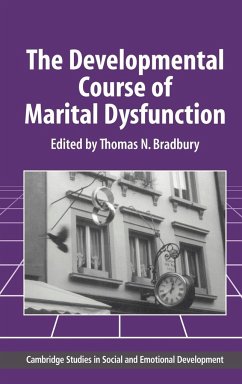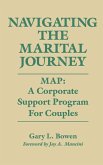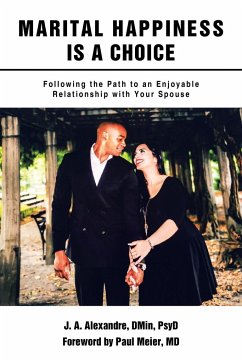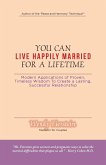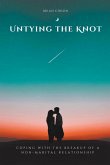The Developmental Course of Marital Dysfunction
Herausgeber: Bradbury, Thomas N.; Emde, Robert; Shantz, Carolyn
The Developmental Course of Marital Dysfunction
Herausgeber: Bradbury, Thomas N.; Emde, Robert; Shantz, Carolyn
- Gebundenes Buch
- Merkliste
- Auf die Merkliste
- Bewerten Bewerten
- Teilen
- Produkt teilen
- Produkterinnerung
- Produkterinnerung
Leading researchers present research and theory that focus on how marital dysfunction develops among newly wed couples.
Andere Kunden interessierten sich auch für
![Navigating the Marital Journey Navigating the Marital Journey]() Gary L. BowenNavigating the Marital Journey92,99 €
Gary L. BowenNavigating the Marital Journey92,99 €![Marital Happiness Is a Choice Marital Happiness Is a Choice]() J. A. Alexandre DMin PsyDMarital Happiness Is a Choice22,99 €
J. A. Alexandre DMin PsyDMarital Happiness Is a Choice22,99 €![Marital Instability Marital Instability]() Joseph VeroffMarital Instability93,99 €
Joseph VeroffMarital Instability93,99 €![You Can Live Happily Married for a Lifetime You Can Live Happily Married for a Lifetime]() Wendy FiersteinYou Can Live Happily Married for a Lifetime12,99 €
Wendy FiersteinYou Can Live Happily Married for a Lifetime12,99 €![COPING WITH MARITAL INFIDELITY COPING WITH MARITAL INFIDELITY]() James T. BornCOPING WITH MARITAL INFIDELITY12,99 €
James T. BornCOPING WITH MARITAL INFIDELITY12,99 €![Untying the Knot Coping with the Breakup of a Non-Marital Relationship Untying the Knot Coping with the Breakup of a Non-Marital Relationship]() Brian GibsonUntying the Knot Coping with the Breakup of a Non-Marital Relationship15,99 €
Brian GibsonUntying the Knot Coping with the Breakup of a Non-Marital Relationship15,99 €![The Marital Voyage The Marital Voyage]() C. R. TrivediThe Marital Voyage14,99 €
C. R. TrivediThe Marital Voyage14,99 €-
-
-
Leading researchers present research and theory that focus on how marital dysfunction develops among newly wed couples.
Produktdetails
- Produktdetails
- Verlag: Cambridge University Press
- Seitenzahl: 492
- Erscheinungstermin: 18. Oktober 2012
- Englisch
- Abmessung: 235mm x 157mm x 31mm
- Gewicht: 857g
- ISBN-13: 9780521451901
- ISBN-10: 0521451906
- Artikelnr.: 21825779
- Herstellerkennzeichnung
- Libri GmbH
- Europaallee 1
- 36244 Bad Hersfeld
- gpsr@libri.de
- Verlag: Cambridge University Press
- Seitenzahl: 492
- Erscheinungstermin: 18. Oktober 2012
- Englisch
- Abmessung: 235mm x 157mm x 31mm
- Gewicht: 857g
- ISBN-13: 9780521451901
- ISBN-10: 0521451906
- Artikelnr.: 21825779
- Herstellerkennzeichnung
- Libri GmbH
- Europaallee 1
- 36244 Bad Hersfeld
- gpsr@libri.de
List of contributors; Foreword Robert L. Weiss; Introduction: the
developmental course of marital dysfunction Thomas N. Bradbury; Part I.
Conceptual and Empirical Contributions: 1. Communication in early marriage:
responses to conflict, nonverbal accuracy and conversational patterns
Patricia Noller and Judith A. Feeney; 2. Marital aggression, quality and
stability in the first year of marriage: findings from the Buffalo newlywed
study Kenneth E. Leonard and Linda J. Roberts; 3. Accommodation processes
during the early years of marriage Caryl E. Rusbult, Victor L. Bissonnette,
Ximena B. Arriaga and Chante L. Cox; 4. The psychological infrastructure of
courtship and marriage: the role of personality and compatibility in
romantic relationships Ted L. Huston and Renate M. Houts; 5. Happiness in
stable marriages: the early years Joseph Veroff, Elizabeth Douvan, Terri L.
Orbuch and Linda K. Acitelli; 6. Developmental changes in marital
satisfaction: a 6-year prospective longitudinal study of newlywed couples
Lawrence A. Kurdek; 7. The development of marriage: a 9-year perspective
Kristin Lindahl, Mari Clements and Howard Markman; 8. Premarital predictors
of relationship outcomes: a 15-year follow-up of the Boston couples study
Charles T. Hill and Letitia Anne Peplau; 9. Optimizing longitudinal
research for understanding and preventing marital dysfunction Thomas N.
Bradbury, Catherine L. Cohan and Benjamin R. Karney; 10. Socialization into
marital roles: testing a contextual, developmental model of marital
functioning Irv Tallman, Peter J. Burke and Victor Gecas; 11. Physical
aggression in marriage: a developmental analysis K. Daniel O'Leary and
Michele Cascardi; Part II. Invited Commentaries: 12. On intervention and
relationship events: a marital therapist looks at longitudinal research on
marriage Andrew Christensen; 13. A developmentalist's perspective on
marital change Ross D. Parke; 14. Couples, gender and time: comments on
method David A. Kenny; 15. On the etiology of marital decay and its
consequences: comments from a clinical psychologist John M. Gottman; 16.
Problems and prospects in longitudinal research on marriage: a
sociologist's perspective Norval D. Glenn; 17. A social psychological view
of marital dysfunction and stability Ellen Berscheid; Author index; Subject
index.
developmental course of marital dysfunction Thomas N. Bradbury; Part I.
Conceptual and Empirical Contributions: 1. Communication in early marriage:
responses to conflict, nonverbal accuracy and conversational patterns
Patricia Noller and Judith A. Feeney; 2. Marital aggression, quality and
stability in the first year of marriage: findings from the Buffalo newlywed
study Kenneth E. Leonard and Linda J. Roberts; 3. Accommodation processes
during the early years of marriage Caryl E. Rusbult, Victor L. Bissonnette,
Ximena B. Arriaga and Chante L. Cox; 4. The psychological infrastructure of
courtship and marriage: the role of personality and compatibility in
romantic relationships Ted L. Huston and Renate M. Houts; 5. Happiness in
stable marriages: the early years Joseph Veroff, Elizabeth Douvan, Terri L.
Orbuch and Linda K. Acitelli; 6. Developmental changes in marital
satisfaction: a 6-year prospective longitudinal study of newlywed couples
Lawrence A. Kurdek; 7. The development of marriage: a 9-year perspective
Kristin Lindahl, Mari Clements and Howard Markman; 8. Premarital predictors
of relationship outcomes: a 15-year follow-up of the Boston couples study
Charles T. Hill and Letitia Anne Peplau; 9. Optimizing longitudinal
research for understanding and preventing marital dysfunction Thomas N.
Bradbury, Catherine L. Cohan and Benjamin R. Karney; 10. Socialization into
marital roles: testing a contextual, developmental model of marital
functioning Irv Tallman, Peter J. Burke and Victor Gecas; 11. Physical
aggression in marriage: a developmental analysis K. Daniel O'Leary and
Michele Cascardi; Part II. Invited Commentaries: 12. On intervention and
relationship events: a marital therapist looks at longitudinal research on
marriage Andrew Christensen; 13. A developmentalist's perspective on
marital change Ross D. Parke; 14. Couples, gender and time: comments on
method David A. Kenny; 15. On the etiology of marital decay and its
consequences: comments from a clinical psychologist John M. Gottman; 16.
Problems and prospects in longitudinal research on marriage: a
sociologist's perspective Norval D. Glenn; 17. A social psychological view
of marital dysfunction and stability Ellen Berscheid; Author index; Subject
index.
List of contributors; Foreword Robert L. Weiss; Introduction: the
developmental course of marital dysfunction Thomas N. Bradbury; Part I.
Conceptual and Empirical Contributions: 1. Communication in early marriage:
responses to conflict, nonverbal accuracy and conversational patterns
Patricia Noller and Judith A. Feeney; 2. Marital aggression, quality and
stability in the first year of marriage: findings from the Buffalo newlywed
study Kenneth E. Leonard and Linda J. Roberts; 3. Accommodation processes
during the early years of marriage Caryl E. Rusbult, Victor L. Bissonnette,
Ximena B. Arriaga and Chante L. Cox; 4. The psychological infrastructure of
courtship and marriage: the role of personality and compatibility in
romantic relationships Ted L. Huston and Renate M. Houts; 5. Happiness in
stable marriages: the early years Joseph Veroff, Elizabeth Douvan, Terri L.
Orbuch and Linda K. Acitelli; 6. Developmental changes in marital
satisfaction: a 6-year prospective longitudinal study of newlywed couples
Lawrence A. Kurdek; 7. The development of marriage: a 9-year perspective
Kristin Lindahl, Mari Clements and Howard Markman; 8. Premarital predictors
of relationship outcomes: a 15-year follow-up of the Boston couples study
Charles T. Hill and Letitia Anne Peplau; 9. Optimizing longitudinal
research for understanding and preventing marital dysfunction Thomas N.
Bradbury, Catherine L. Cohan and Benjamin R. Karney; 10. Socialization into
marital roles: testing a contextual, developmental model of marital
functioning Irv Tallman, Peter J. Burke and Victor Gecas; 11. Physical
aggression in marriage: a developmental analysis K. Daniel O'Leary and
Michele Cascardi; Part II. Invited Commentaries: 12. On intervention and
relationship events: a marital therapist looks at longitudinal research on
marriage Andrew Christensen; 13. A developmentalist's perspective on
marital change Ross D. Parke; 14. Couples, gender and time: comments on
method David A. Kenny; 15. On the etiology of marital decay and its
consequences: comments from a clinical psychologist John M. Gottman; 16.
Problems and prospects in longitudinal research on marriage: a
sociologist's perspective Norval D. Glenn; 17. A social psychological view
of marital dysfunction and stability Ellen Berscheid; Author index; Subject
index.
developmental course of marital dysfunction Thomas N. Bradbury; Part I.
Conceptual and Empirical Contributions: 1. Communication in early marriage:
responses to conflict, nonverbal accuracy and conversational patterns
Patricia Noller and Judith A. Feeney; 2. Marital aggression, quality and
stability in the first year of marriage: findings from the Buffalo newlywed
study Kenneth E. Leonard and Linda J. Roberts; 3. Accommodation processes
during the early years of marriage Caryl E. Rusbult, Victor L. Bissonnette,
Ximena B. Arriaga and Chante L. Cox; 4. The psychological infrastructure of
courtship and marriage: the role of personality and compatibility in
romantic relationships Ted L. Huston and Renate M. Houts; 5. Happiness in
stable marriages: the early years Joseph Veroff, Elizabeth Douvan, Terri L.
Orbuch and Linda K. Acitelli; 6. Developmental changes in marital
satisfaction: a 6-year prospective longitudinal study of newlywed couples
Lawrence A. Kurdek; 7. The development of marriage: a 9-year perspective
Kristin Lindahl, Mari Clements and Howard Markman; 8. Premarital predictors
of relationship outcomes: a 15-year follow-up of the Boston couples study
Charles T. Hill and Letitia Anne Peplau; 9. Optimizing longitudinal
research for understanding and preventing marital dysfunction Thomas N.
Bradbury, Catherine L. Cohan and Benjamin R. Karney; 10. Socialization into
marital roles: testing a contextual, developmental model of marital
functioning Irv Tallman, Peter J. Burke and Victor Gecas; 11. Physical
aggression in marriage: a developmental analysis K. Daniel O'Leary and
Michele Cascardi; Part II. Invited Commentaries: 12. On intervention and
relationship events: a marital therapist looks at longitudinal research on
marriage Andrew Christensen; 13. A developmentalist's perspective on
marital change Ross D. Parke; 14. Couples, gender and time: comments on
method David A. Kenny; 15. On the etiology of marital decay and its
consequences: comments from a clinical psychologist John M. Gottman; 16.
Problems and prospects in longitudinal research on marriage: a
sociologist's perspective Norval D. Glenn; 17. A social psychological view
of marital dysfunction and stability Ellen Berscheid; Author index; Subject
index.

